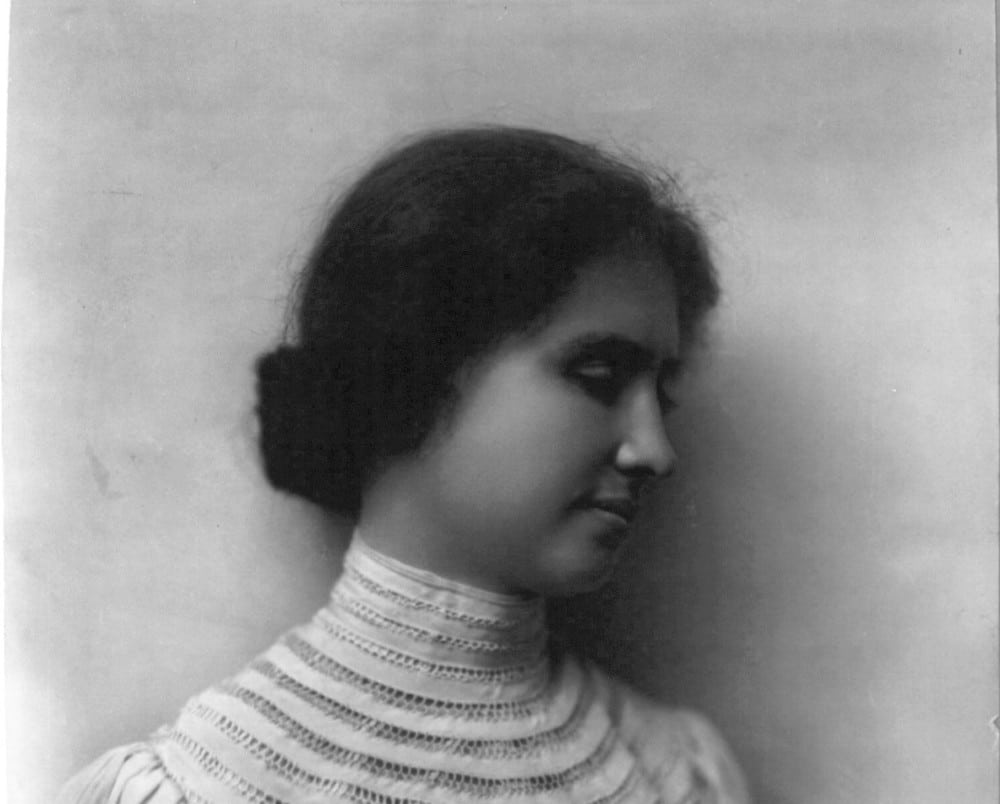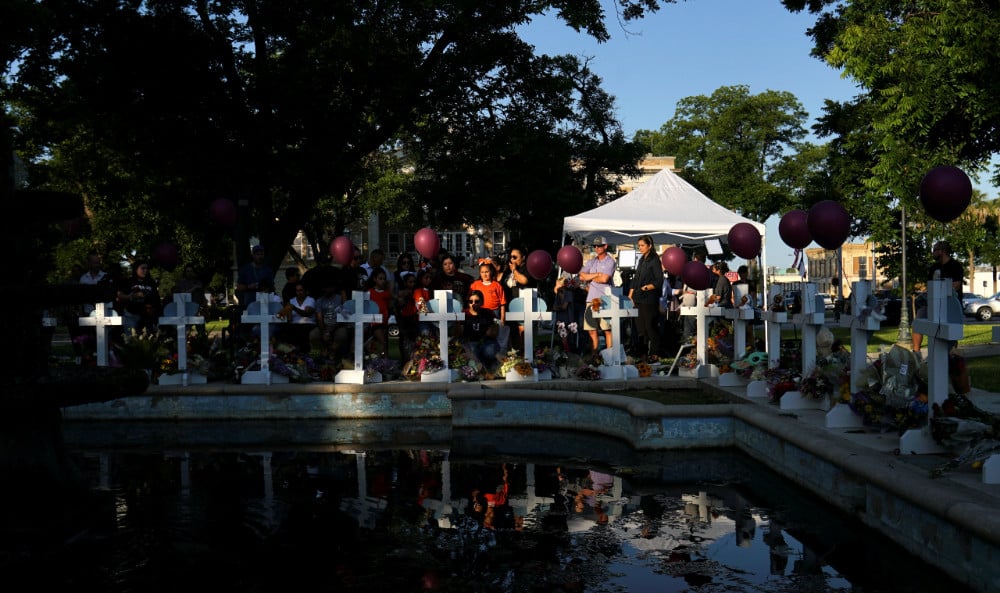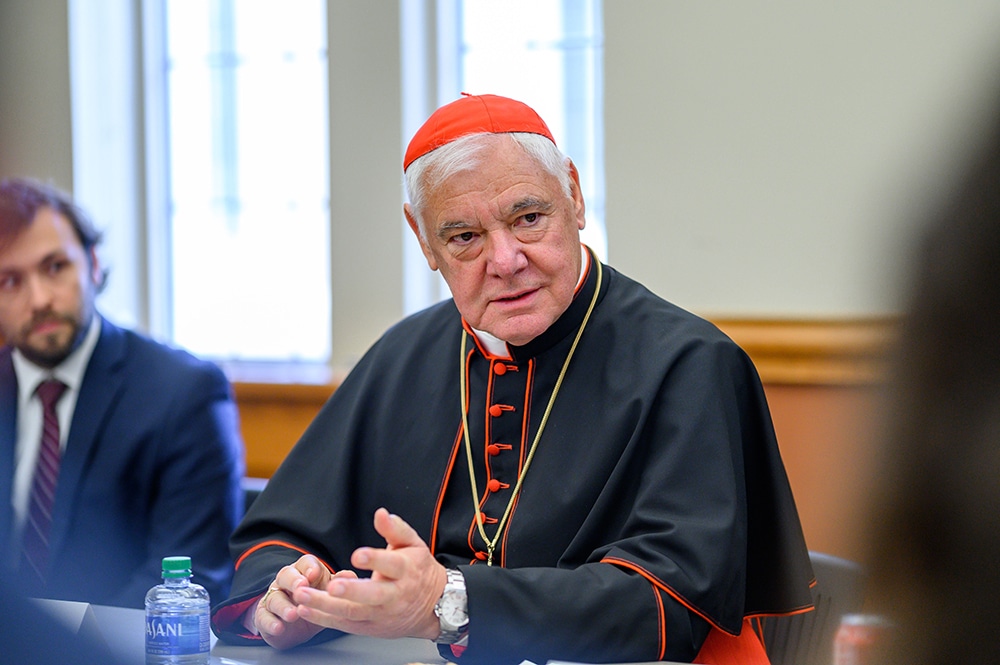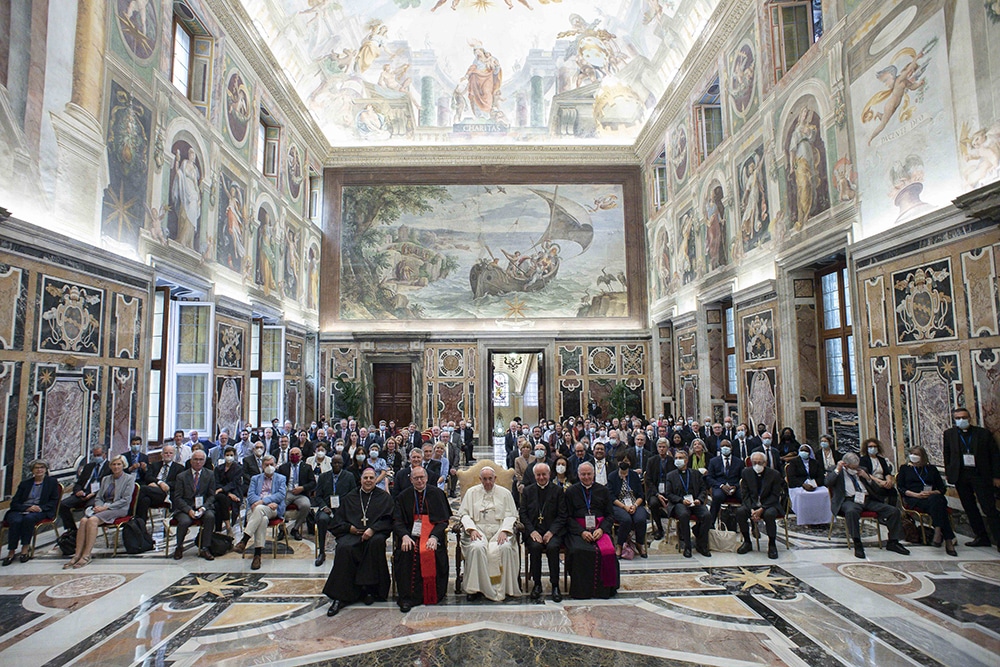It’s Respect Life Sunday, and today parishes across the nation will emphasize the current issues that threaten the sanctity of human life. Although abortion is the pre-eminent respect-life issue, other threats to human dignity exist, including the death penalty, suicide, embryonic stem-cell research, cloning and end-of-life care for the sick and elderly. Our Sunday Visitor recently compiled a sampling of some creative ways Catholics can work to help build a consistent life ethic in their own neighborhoods.
Be penny-wise
Susan Nero, a parishioner at Holy Name of Jesus Parish in West Palm Beach, Fla., coordinates a bake sale every Father’s Day to raise money for “Pennies for Babies,” a local organization that helps mothers pay expenses such as utility bills, doctor’s charges and rent. She and other volunteers continue the drive throughout the year by inviting people to fill baby bottles with pennies, and the parish periodically holds raffles for the same cause. The last Father’s Day bake sale netted $719 for the organization, and the baby-bottle donations total about $40 a month.
Action item: Little things can add up, and financial resources can accumulate one dollar or one penny at a time. Small, intimate fundraisers like these encourage donations from a wider pool of people – and communicate the pro-life message to them as well.
Teach your legislators well
“One of the most important things we can do as citizens is to be here and learn to understand the issues,” Father Ragan Schriver, director of Catholic Charities of East Tennessee, told 250 middle and high school students at a “Catholic Day on the Hill” at the state capitol in Nashville last March. “It’s a great day to recognize what our faith tells us as Catholic Christians to advocate for.”
In agreement was Candy Hill, senior vice president for social policy at Catholic Charities USA, who indicated our duty extends even to contacting elected representatives to urge them to pass laws that respect life and human dignity. “We put them in office, and we need to hold them accountable,”she told the gathering.
The 2006 “Catholic Day on the Hill” focused on five life issues – abortion, health care, capital punishment, immigration reform and stem-cell research. Many other state Catholic conferences host similar events each year.
Action item: Study the issues – not just what the Church teaches, but why, so you can defend and explain the Catholic point of view. Read quality Catholic books, publications and pamphlets. Attend parish and diocesan adult-education sessions on the life and social issues. Get to know where your elected officials stand on these issues and contact them when legislation is pending.
Be a good caregiver.
Jane Hayes, 83, sits in her wheelchair near a home oxygen system, taking a breathing treatment and waiting for her caregiver to arrive.
“She takes my blood pressure, checks my heart rate and makes sure I have my important medicines,”Hayes, told the Catholic Key, newspaper for the Archdiocese of Kansas City. “But she does more than that. She laughs with me. I get dressed because Julie’s coming to see me. Julie keeps me alive.”
What better testimony for a pro-life cause than that?
Hayes’ caregiver, Julie Horton, a registered and certified palliative care nurse with a local hospice, has had Hayes as a hospice patient for more than a year. She visits Hayes at her home three days a week, whether it’s for several hours or just a few minutes. And she loves her work.
“People who have been diagnosed with a life-limiting illness and the elderly often find they have little control over their lives,” Horton said. “We help them live where they are happiest, provide pain management and palliative care, and focus on life.”
Father Myles Sheehan, a Jesuit and medical doctor at Loyola University in Chicago, says that by properly treating pain and caring for the entire person who is suffering, we can model a “happy death”for a culture that is terrified of dying.
It’s a “big lie” that dying necessarily means being alone, miserable and in uncontrolled pain, since almost all pain is controllable through medication. Death is not a failure, he says, and the dying need to know what is happening to them so they can prepare for the end of life.
Action item: Embrace the role of caregiver. Treat the elderly and dying with the utmost human compassion, paying special attention to their spiritual needs.
Instead of nitpicking, pick knitting
Rita Diller, pro-life director for the Diocese of Amarillo, Texas, started the Blessing Blanket Ministry a dozen years ago. She and her helpers create beautiful baby blankets embroidered with the words “Wrapped in Jesus’ Love.” Many schoolchildren, including homeschoolers, assist with the project. The blankets are given to needy mothers and their babies.
Middle school and high school students at St. Anne’s School in nearby Canyon dressed “fetal models” in little blessing blankets along with fetal-development charts and distributed these to parishioners as they came out of Mass one Sunday.
Direct assistance to the needy often speaks the loudest about our pro-life convictions.”One of the strongest pro-life examples I ever saw was when my mother helped out a family friend whose young daughter became pregnant while still in high school,” wrote Susan Hines-Brigger in St. Anthony Messenger. “At a time when many others sat in judgment of the girl and her family, my mom offered reassurance, baby clothes and whatever else was needed.”
Action item: Being pro-life is not just about marching and sending postcards. Seek and find ways to offer your love and support personally to persons in need.
Show ’em the truth
From their home in New Jersey, Mike and Maureen Nuzzi seized an opportunity to educate the general public about the humanity of the unborn child. They created a “Truth Booth” that can be set up at shopping malls and show four-dimensional color ultrasound video images of babies in the womb. When passersby stop to view the images, booth attendants are there to answer questions and provide helpful and informative literature in a completely non-confrontational manner.
“Nothing speaks like the truth, and it cannot be hidden for long,”Mike told NRLC News. “We must use technology to give these babies a face and identity.”
Their website (www.truthbooth.org) provides information and advice on how to go about establishing a Truth Booth in your own area.
Action item: Whenever possible, find ways to use the newest technology to bring home the pro-life message, and always try to meet people where they gather – like youths at a mall.
Put the rosary beads to good use
Jackie Witte, a member of St. Joseph Parish in Sacramento, encourages praying the “pro-life rosary.”
This rosary has beads of seven different colors, with each color representing a different intention related to respect for life -including conversion and reparation for the sins of persons involved in abortions, prayers that pro-life principles will become law and prayers to the Immaculate Heart of Mary. Variations of the “pro-life rosary” also exist.
The rosary is available through many Catholic religious-goods stores and Internet shops.
The Rosary is also a favorite for Catholics who organize prayer vigils outside state prisons on the evenings of scheduled executions. The Pro-Life Ministries of the Diocese of Lafayette, La., recommends praying the Rosary for five life intentions: the slaughtered innocent unborn, the hopeless and suicidal, the innocent victims of violence, the condemned prisoners facing capital punishment and suffering patients who seek pain relief through euthanasia.
Action item: Never underestimate the power of prayer in the fight for life – it may be our strongest weapon.
Life is sacred, spread the word
German-born Dr. Hans Geisler may have retired from the practice of medicine in 2004, but that hardly means he’s been idling away his golden years. After giving up his obstetrics-gynecology practice in 2004, he prepared a 45-minute PowerPoint presentation on stem-cell research and human cloning.
“His presentation demonstrates the differences between adult and embryonic stem-cell research, as well as the ethical issues associated with stem-cell research and cloning,” reports the website of Right to Life Indianapolis. “His use of simple diagrams and pictures transforms this somewhat complex issue into a simple, entertaining lesson that we should all learn.”
Geisler has made several of these PowerPoint presentations along with other lectures on life issues for area organizations and parishes, including his own St. Luke Parish in Indianapolis.
Action item: Retirement means more free time to help champion the respect-life message. Use your lifelong skills to great advantage for a worthy cause.
Accessorize
In 1974, Virginia and Ellis Evers of San Diego, Calif., saw a full-page advertisement in the local newspaper that pictured the tiny feet of a 10-week-old unborn baby being held between a man’s fingers and thumb. Inspired by that image, Virginia designed the now-familiar “Precious Feet”lapel pin for pro-lifers to wear. Five years later, Virginia’s pin was named the international pro-life symbol at a worldwide symposium in Ireland, and to date some 12 million such pins have been sold and distributed through religious-goods stores and pro-life centers everywhere.
Says pin-wearer Cecelia Cody, executive director of California Right to Life: “I have had little children come up to me at the mall or grocery store and ask me what my pin is, and when I explain it to them they often get a bigger sibling or parents to ‘come see’ and often exclaim, ‘Look Mommy, it even has toes!’ “
Action item: Get the “Precious Feet” pin, bumper stickers, license plates, checks (www.lifechecks .com), envelope seals and return-address stickers that carry pro-life messages – any thing that may invite comment and attention. Be prepared to answer the kinds of questions you are likely to be asked by offering resources and referrals to local pro-life pregnancy centers.
Give of yourself -literally
Father Ken Riley, pastor of St. Bernadette Parish in Kansas City, became a believer in organ donation after getting involved with a bone-marrow drive for a second-grader who suffered from leukemia and seeing his father’s live saved by a double-organ transplant.
So when the call came three years ago that he was a potential match on the Heart of America Bone Marrow Registry’s databank, he readily agreed to donate adult stem cells to help a Kentucky woman who had leukemia.
The woman, Lee Ann Collins, recovered thanks to Father Riley’s donation. And in a surprise meeting set up by local organizers of a Kentucky pro-life rally, she finally met the priest in person just last June.
“I was so surprised, I had no idea they planned this,” Collins told the Catholic Key diocesan newspaper. “What can you say, what words can you say to someone who saved your life?”
Action item: Bone marrow, non-vital organs, whole blood and plasma – there are many ways to give the “gift of life” to another in a morally acceptable manner. Adult stem-cell donations already save lives, and their success rate defies the claims of researchers who claim they need to kill human embryos to find cures with embryonic stem cells. Consider the prospects of donation.
Do the walk of life
Dennis Stoll, a member of Most Sacred Heart Parish in Florissant, Mo., joined dozens of other college-age people for the Crossroads Pro-Life Walk Across America over the summer (www.crossroadswalk.com). The organization sponsors three simultaneous walks from the west coast to the east coast of the United States, beginning in mid-May and merging in mid-August for a rally on the steps of the U.S. Capitol, according to Catholic News Service. Some walked the entire distance; others joined and left the route as they were able.
“There are a lot of challenges and difficulties” in such a cross-country trek, Stoll told CNS, but “maybe someone [who is considering an abortion] will see us along the way, and it might make a difference in their life. It may be a matter of life or death. Who knows? We’ll never know until we meet God one day.”
Another opportunity is The Out of the Darkness Overnight walk (www.theovernight.org), a 20-mile trek through the night, from dusk until dawn, in which walkers take advance pledges to raise funds for the American Foundation for Suicide Prevention. Last year, walks in San Francisco and Chicago drew 2,400 participants who raised more than $3.6 million in donations.
Action item: Join a walk, bike ride, rally, parade or other such function to support the pro-life message in your own community – or gather a few friends and organize one yourself.
Meet a friend at the bars
Two years ago, the sister of Maryland death-row inmate Vernon Evans Jr. told Gertrude “Trudy” Conway, a philosophy professor at Mount St. Mary’s University in Emmitsburg, Md., that her brother would welcome communication with Conway and her students. Since that time, she has written to and visited Evans many times and at least two of her students have corresponded with him as well.
Evans, who insists he is innocent of the murders for which he was convicted and sentenced to death, was scheduled to be put to death by lethal injection last February but received a last-minute stay of execution.
Said Sarah Pilisz, one of the students who befriended Evans: “I would stress even for people who will never know someone on death row to recognize that regardless of any crime, they are still a child of God. Our actions should be reflections of God’s love and charity.”
Action item: Ask a priest, deacon, religious or lay person who is involved with prison ministry to recommend a prisoner with whom you might correspond. Better still, volunteer to become part of a prisoner visitation team.
Clown around a bit
In the Diocese of Buffalo, recently retired pro-life director Judy Gorman began a program called “Clowns for Life.” In visits to groups of children aged 5 to 9, a narrator and four clowns show the kids how to respect all life, regardless of disability, ethnic group or age.
Through skits, song, a question-and-answer session and the distribution of “hug stickers,” the clowns teach respect-life principles in an age-appropriate way to the next generation in hopes the children will carry that message in their heart throughout their adult years.
Action item: Target certain age groups with sensitivity toward their maturity and ability to understand. Creative ideas such as this one will gain the children’s attention and help them become more receptive to the key respect-life message.
Forgive, even when it hurts to do so
After her son and daughter-in-law, John and Nancy Bosco, were brutally murdered in their Montana home in 1993, author Antoinette Bosco had to re-examine her views on capital punishment.
“I wanted the killer dead. I wanted to kill him with my own hands,”she said last February in written testimony to a U.S. Senate subcommittee charged with studying the death-penalty issue. “But that feeling also tormented me, for I had always been opposed to the death penalty. I felt now I was being tested on whether my values were permanent, or primarily based on human feelings and expediency.”
She went on: “When it hits you personally, the anger and pain of your loss makes you want to tear apart that person who stole your loved one and your happiness. But does this do any good in the long run? And should we be in the business of killing people?”
Bosco said she finally was able to “grasp truth again” that “the state is no more justified in taking a life than is an individual.”
The killer, Joseph “Shadow”Clark, is now serving a life sentence. Bosco told the subcommittee that he has written to her asking forgiveness for what he has done.
“Not a day goes by that is free from the pain of what I did,” Clark wrote last January. “I was a very foolish kid, and I truly regret my actions.”
Since the murders, Bosco has written and lectured widely in opposition to the use of capital punishment.
Action item: If Antoinette Bosco and others can forgive a murderer, then why do so many of us desire revenge or “payback” for offenses done to us? Work at forgiving and reconciling with others.
Put it to music
If to sing is to pray twice, as St. Augustine once said, then perhaps the message about respect for human life can get an added boost by expressing it in song.
Singer-songwriter Kara Klein was just 19 years old when she performed at World Youth Day in Cologne, Germany, in August 2005. A member of Mary Queen of Peace Parish in Mandeville, La., who attends The Catholic University of America in Washington, D.C., Klein writes her own music and has a full-length CD to her credit.
One of the original songs she recorded was titled “Still Beautiful (Terri’s Song),” a eulogy of sorts to Terri Schindler-Schiavo, the disabled Florida woman whose feeding tube was removed by court order after a 13-year legal battle for her life between her husband and her family. Schiavo died on March 31, 2005.
“Do you think I’m beautiful now?”the song lyrics ask. “Even when you’re carrying me because I am too weak to walk / And I have lost control of everything somehow / Do you think I’m beautiful now?”
Klein sang that song in Cologne and has also performed it for members of Congress, for a women’s lobby group and at the National Right to Life Committee convention – with Terri Schiavo’s family in attendance.
For every sale of her debut CD, “A Touch of Your Grace,” Klein donates a dollar to the Susan B. Anthony List, an organization that supports pro-life women candidates at the state and national levels. Profits from the “Beautiful Still” single go to the Terri Schindler-Schiavo Foundation, which works to protect the human rights and dignity of disabled persons (www.karaklein.com).
Rock for Life, a project of the American Life League, also uses music to get the pro-life message across. The organization “is committed to offering the truth about abortion, infanticide, and euthanasia to America’s youth through music and ministry,” according to its website (www.rockforlife.org).
Bands that participate in Rock for Life put on concerts where they minister to young people through their music as well as in their personal testimonies. They also support local pro-life efforts, participate in prayer services and encourage peaceful forms of activism.
Rock for Life “works to bring together bands who stand for the truth – that life is sacred from fertilization until natural death – with no exceptions, no compromise and no apologies,” it states unequivocally. “Rock for Life is dedicated to this fight until abortion is abolished and a respect for the gift of life is restored.”
Action item: Raise your voice in one way or the other – in song or in speaking out against injustice – at every opportunity. Often we who respect life can be a voice for those who cannot speak for themselves.
Stand up for life at all costs
In Morrison, Ill., pharmacist Luke Vander Bleek faced a dilemma: Stand up for his beliefs, or begin dispensing the newly approved “morning-after” pill and sometimes abortifacient, Plan B.
He chose the former, and so in June 2005 he filed a lawsuit against Illinois Gov. Rod Blagojevich to protect his rights of conscience.
Vander Bleek, owner and pharmacist of Fitzgerald Pharmacy and three other stores in northern Illinois, felt he had to stand with his Catholic principles. “I got involved in pharmacy to treat pain and suffering and to preserve life,” he told The Observer, Rockford’s diocesan newspaper. “I object to the idea that I would be involved in the termination of life because I am being forced to do something outside my moral circle.”
Blagojevich had issued an “emergency rule” requiring pharmacists to dispense the “emergency contraceptive”drug several weeks earlier. Americans United for Life, a Chicago-based public-interest law firm that handles a wide range of respect-life issues, helped Vander Bleek with the suit.
In the first four years Plan B was available, Vander Bleek twice was presented with a prescription for the drug by a customer. Both times he politely explained it was against his store’s policy to dispense or procure the drug. When one of the women asked why, he told her, “I have a policy of conscientious objection because the drug could abort the fetus you might be carrying.”
The woman called the next day to thank him and tell him she did not fill the prescription.
Plan B is actually two sets of two pills. The first set must be taken within 72 hours of unprotected intercourse. The second set is taken 12 hours later. Depending on what stage a woman is in her menstrual cycle, the pills can prevent the embryo’s implantation in the uterus – that is, cause an abortion – or prevent the egg from being fertilized.
In August, the Bush administration approved the “morning-after” pill for over-the-counter sale to adults. Girls under 18 must still obtain a doctor’s prescription.
Action item: Have the courage to stand firm on Catholic moral principles, even when it’s not a popular position to take. (It rarely is.)





